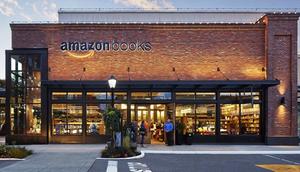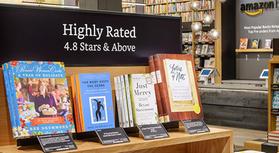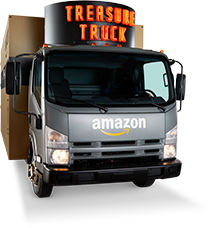 In the week since Sandeep Mathrani, CEO of General Growth Properties, a real estate investment trust that owns and manages 120 shopping malls, blurted out in a conference call with analysts that Amazon planned to open 300-400 bricks-and-mortar bookstores, many have accepted that, in reality, the company probably plans to open only a half dozen in the next year or two. Still, the frenzy about Amazon Books has led in the past few days to a lot of fascinating observations and speculation about Amazon and bricks-and-mortar stores-- bookstores as well as stores selling other merchandise.
In the week since Sandeep Mathrani, CEO of General Growth Properties, a real estate investment trust that owns and manages 120 shopping malls, blurted out in a conference call with analysts that Amazon planned to open 300-400 bricks-and-mortar bookstores, many have accepted that, in reality, the company probably plans to open only a half dozen in the next year or two. Still, the frenzy about Amazon Books has led in the past few days to a lot of fascinating observations and speculation about Amazon and bricks-and-mortar stores-- bookstores as well as stores selling other merchandise.
---
In his Shatzkin Files, Idea Logical Company's Mike Shatzkin stated on Wednesday that "when you think it through, it not only doesn't seem crazy that Amazon would open stores, it seems like an obviously compelling move." He noted that other online retailers have opened bricks-and-mortar locations and said, " 'Omni-channel,' which is really a new-fangled fancy term for selling both online and through a brick store, is the buzzword du jour of retailing. Actually, the online piece of that is the harder part and Amazon already had that licked."
B&N survived while Borders did not in part because it had a better distribution system, he continued. Now, Amazon has a better distribution system, with "many times the number of storage points as B&N and Ingram and Baker & Taylor combined!" In addition, "Amazon has tons of information that nobody else does that would inform their stocking decisions if they harnessed it. They know where searches are coming from for particular book titles or for generic needs, both geographically and psychographically. And they probably can detect early lifts for particular books faster than anybody else, simply because they have more data."
In addition, "Amazon has tons of information that nobody else does that would inform their stocking decisions if they harnessed it. They know where searches are coming from for particular book titles or for generic needs, both geographically and psychographically. And they probably can detect early lifts for particular books faster than anybody else, simply because they have more data."
He also argued that the decision by Amazon's book retailing competitors not to sell the titles Amazon publishes may have helped push the giant toward opening stores. "If the stores had stocked their titles, Amazon might have chosen to use their distribution center advantage to start wholesaling, rather than to support their own retail locations (as they appear to be doing)." As a result, having stores "gives them access to at least some brick-and-mortar retail locations for their publishing output, which otherwise they can only sell online. And the other is that it capitalizes on their distribution centers, delivering additional sales and margin for investments already made."
Shatzkin also suggested another way Amazon could be disruptive to booksellers: "They are a tech company that likes to have computers make decisions that in other companies and in other times have been made by humans. I suspect they'll figure out pretty fast that they will want to have some sort of vendor-managed inventory system to streamline and optimize the stocking decisions for what will almost certainly be a growing network of retail locations."
---
Valuewalk quoted Wharton management professor Daniel Raff, who noted two key elements about the Amazon Books store in Seattle: "One, it doesn't seem to be [about] just books, but also participation in the Amazon ecosystem. The other is, they are in a position to stock and promote these stores quite inexpensively. That is a competitive edge relative to new brick-and-mortar stores."
In addition, Raff said, Amazon has filed patent applications involving "recognizing who their customers are and their payment information while they are at the shelves and contemplating products, and allowing a cashier-less checkout." Amanda Nicholson, professor of retail practice at Syracuse University's Whitman School of Management, said such a program would cut overhead and make the store more competitive with bricks-and-mortar competition.
With bricks-and-mortar "depots," Amazon could send shipments to locations where customers could pick up their orders, and be "ahead of the game in terms of shipping costs," Raff continued. And customers might then buy other merchandise.
Still, he compared rolling out many more stories in a short period of time with "a D-Day invasion."
---.jpg) In a blog post for the Robin Report, Robin Lewis, CEO and founder of the Robin Report and a professor at the Graduate School of Professional Studies at the Fashion Institute of Technology, noted that he had predicted "as far back as 2010" that Amazon would open physical stores, but had thought they would feature apparel, "for all the obvious reasons, including touching, feeling and trying on for look and fit--all of which results in an astronomically high return rate of around 40% when purchased online."
In a blog post for the Robin Report, Robin Lewis, CEO and founder of the Robin Report and a professor at the Graduate School of Professional Studies at the Fashion Institute of Technology, noted that he had predicted "as far back as 2010" that Amazon would open physical stores, but had thought they would feature apparel, "for all the obvious reasons, including touching, feeling and trying on for look and fit--all of which results in an astronomically high return rate of around 40% when purchased online."
He predicted that rather than targeting indies or Barnes & Noble retail stores, "Amazon's first attack will strike a blow to the heart" of Barnes & Noble Education, which was spun off from B&N last year, by expanding on the distribution locations Amazon already has at at least three campuses.
"Going after college markets first is a strategic no-brainer," he wrote. "Having been born with digital brain cells, this student generation is Amazon's sweet spot. A survey from SheerID found that 77% of college students purchased something online in the past 30 days, and many reports have noted the struggle all colleges are having with managing the tsunami of Amazon packages that are delivered on a daily basis. Note that Amazon has a college Prime rate of $49."
---
On the other hand, a Wall Street analyst suggested that Amazon buying B&N "may make sense." In a Barron's soapbox column, Gabelli & Co.'s John Tinker wrote that such a move would "accelerate" Amazon's move into stores--and the moves would be easy because "the Nook counter at the front of stores could be immediately switched for the Kindle."
Tinker noted that "stagnant e-book sales, more independent book stores, U.K.-based Waterstones revival by focusing on local managers selecting books and dropping the Kindle, suggest renewed consumer interest in physical books."
Tinker also thinks an Amazon purchase of B&N "might" avoid antitrust problems because B&N has only about a "17% share of physical-book sales." Also, "the idea that bankrupt book stores could be 'saved' by Amazon might sell well in Washington--a town in which Jeff Bezos's personal ownership of the Washington Post guarantees superior access. Amazon helped the Justice Department successfully indict Apple for agency price collusion with publishers."
--- In an e-mail with the prescient subject line "Amazon and the Boiling Frog Syndrome," Jack McKeown, co-owner of Books & Books Westhampton Beach, Westhampton Beach, N.Y., sent a striking quote from a BloombergBusiness story this week called "Amazon Building Global Delivery Business to Take on Alibaba," about what appears to be a stealth Amazon project involving buying planes, trucks and ships to create a shipping business that would supplant UPS, FedEx and many other freight companies:
In an e-mail with the prescient subject line "Amazon and the Boiling Frog Syndrome," Jack McKeown, co-owner of Books & Books Westhampton Beach, Westhampton Beach, N.Y., sent a striking quote from a BloombergBusiness story this week called "Amazon Building Global Delivery Business to Take on Alibaba," about what appears to be a stealth Amazon project involving buying planes, trucks and ships to create a shipping business that would supplant UPS, FedEx and many other freight companies:
"This is classic Amazon fashion," said Colin Sebastian, an analyst at Robert W. Baird & Co., who says a global logistics operation could become a $400 billion business for Amazon. "They take baby steps along a long path, which allows some companies that could be disrupted to remain in a sense of denial. Amazon rarely takes one big step forward that shocks the market."
McKeown then wondered: "Now what possible relevance could this have for book publishing and bricks-and-mortar bookstores given Amazon's plans to open a 'modest' number of physical locations?"

